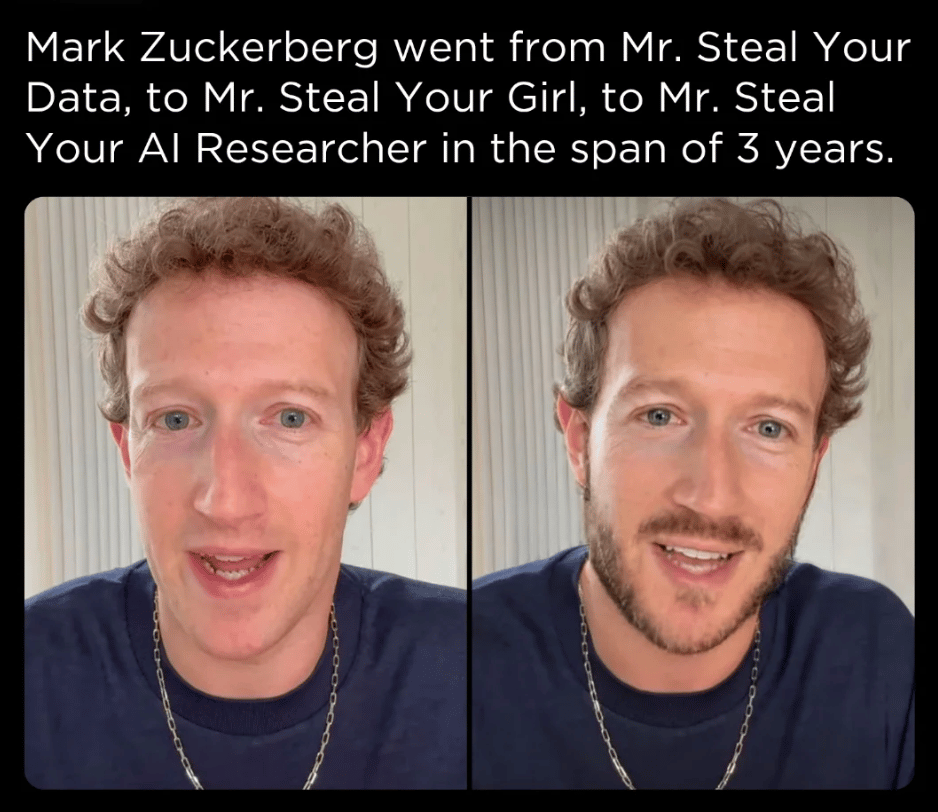
Welcome to FUTURE PROOF, the newsletter dedicated to equipping you with the insights and strategies to thrive in a rapidly evolving world. Each week, we bring you the most impactful news in tech, economics, business, finance, and health, analyzed through the lens of how you can leverage it to secure your future.
Here's what's caught our attention this week:
💡Tech
🤖 The AI Job Disruption Forecast: Prominent Silicon Valley investor Vinod Khosla made a stark prediction this week, forecasting that AI will automate 80% of all jobs by 2030. He argues this technological shift will also cause a massive upheaval of the Fortune 500 as legacy companies fail to adapt.
What it means for you: While forecasts vary, this highlights the accelerating pace of AI's impact on the labor market. It underscores the urgent need for continuous learning and adapting to new roles that leverage AI rather than compete with it. It's a call to action to future-proof your career skills.
💼 Microsoft Cuts 9,000 Jobs in Efficiency Push: In a move reflecting the rapid changes within the tech industry, Microsoft announced it is cutting approximately 4% of its workforce, or about 9,000 jobs. The move is part of a continued push for efficiency and a strategic realignment to pour more resources into high-growth areas like artificial intelligence.
What it means for you: This shows that even in a booming tech sector, companies are aggressively reallocating resources. The AI boom is causing major internal shifts, prioritizing new skills while making others redundant—a sign of the rapid, sometimes painful, transformation happening within the industry.
⚡️ The Energy Cost of AI: A new report reveals that Google's energy consumption for its data centers has doubled in the last four years. This surge is directly linked to the explosive growth and massive computational demands of artificial intelligence and cloud services.
What it means for you: The digital world has a very real physical cost. The AI tools we are all starting to use daily require immense energy, raising significant environmental concerns and driving an urgent search for more sustainable computing solutions. Your digital footprint has a growing energy footprint.
🤖 Amazon's Robot Army Hits One Million: Amazon has reached a major automation milestone, confirming it now has one million robots working in its fulfillment centers. This massive robotic workforce is rapidly approaching a 1:1 ratio with the company's human warehouse employees, signaling a profound shift in global logistics.
What it means for you: The future of logistics and warehouse work is increasingly a collaboration between humans and robots. This boosts efficiency but also fundamentally changes the nature of jobs, shifting them away from manual labor and towards roles in robot maintenance, management, and oversight.
🧠 Meta's Quest for Superintelligence: Mark Zuckerberg has announced a major reorganization at Meta with the creation of Meta Superintelligence Labs (MSL). The ambitious goal is to build "personal superintelligence for everyone," signaling a significant acceleration in the race to develop advanced, personalized AI assistants.
What it means for you: Imagine an AI assistant that doesn't just answer questions but anticipates your needs and manages your life proactively. That's the future Meta is racing to build. This could mean a huge leap in personal productivity, but it also raises critical questions about data privacy and the influence of AI on your daily decisions.

Future Proofing Takeaway: This week's tech news reveals a clear paradox: AI is simultaneously creating immense value and causing significant disruption. The key to future-proofing is to embrace this duality. For individuals, this means aggressively pursuing skills that complement AI—critical thinking, creative problem-solving, and managing automated systems. For businesses, it means not just adopting AI, but also managing its hidden costs, from energy consumption to the human impact of workforce transitions.
💰 Economics, Business & Finance
🛢️ Oil Prices Fall on Supply Fears: Oil prices trended downward this week, influenced by expectations that OPEC+ may increase production and signs of progress in Iran nuclear talks. Both developments could lead to more supply hitting the global market, easing prices.
What it means for you: Geopolitics and global supply decisions directly impact what you pay at the pump. Lower oil prices can provide welcome relief from inflation, but they also reflect a complex international balancing act between supply, demand, and diplomacy.
📉 US Labor Market Stumbles: The U.S. labor market showed a significant sign of weakness as the latest ADP report revealed the first monthly loss in private sector jobs since the post-pandemic recovery began. The data has raised concerns about a potential economic slowdown.
What it means for you: This is a potential early warning sign for the broader economy. A weakening job market could lead to lower consumer spending and a more cautious approach from businesses, potentially impacting everything from hiring to wage growth.
🕵️ U.S. Cracks Down on North Korean “Remote Worker” Scam: The U.S. government has dismantled a major North Korean operation that covertly embedded IT contractors inside American tech companies for years, allegedly funneling millions to the North Korean regime. The scheme highlights a sophisticated method used by Pyongyang to bypass sanctions, raising alarms about security and vetting processes in the remote work era.
What it means for you: This is a wake-up call for businesses about the critical importance of vetting remote workers. For individuals, it's a stark reminder that geopolitical conflicts can play out in unexpected ways, even within corporate firewalls, underscoring the growing challenge of cybersecurity in a globalized workforce.
💸 Markets Spooked by Renewed Tariff Talk: Financial markets showed their sensitivity to trade policy this week, with Dow futures dropping over 250 points following President Donald Trump's suggestion of a potential 70% tariff on certain imports. The move highlights the market's anxiety over the prospect of escalating trade wars.
What it means for you: Political rhetoric has an immediate and tangible impact on financial markets and, by extension, your investments. This highlights how market stability is deeply connected to trade policy uncertainty, making it a key factor to watch.
🏦 Central Banks Signal Caution: Key economic data this week, including global PMI surveys and the US jobs report, are being closely watched by central banks like the Federal Reserve and the ECB. With persistent inflation concerns and the looming impact of trade tariffs, policymakers are signaling a cautious, wait-and-see approach before making any moves on interest rates.
What it means for you: The decisions made by central banks directly affect your wallet. Interest rate changes impact mortgage rates, car loans, and the return on your savings. The current cautious stance means that the high-interest-rate environment could stick around for a while longer.
Future Proofing Takeaway: The economy is being pulled in two directions. While AI creates massive, concentrated wealth (Nvidia), the broader market remains fragile, reacting sharply to geopolitical risks, trade talk, and signs of a weakening labor market. Future-proofing your finances means building resilience. This involves diversifying beyond tech-heavy hype, maintaining a buffer for volatility, and understanding that your portfolio is increasingly exposed to global political and security events, not just traditional economic indicators.
❤️ Health
👂 A Breakthrough in Hearing Restoration: A revolutionary gene therapy has successfully restored hearing in children and adults with a form of congenital deafness. A single injection delivered a healthy copy of the OTOF gene, with significant results seen within a month. This marks a major step forward in treating genetic hearing loss.
What it means for you: This offers immense hope for families affected by genetic deafness. For the rest of us, it's a powerful demonstration of how gene therapy is moving from theory to life-changing reality, paving the way for treatments for a wide range of other genetic conditions.
🦠 Rethinking C. Difficile Treatment: New research reveals why fecal microbiota transplants (FMT) sometimes fail. The study suggests that the success of the treatment depends not just on the transplanted microbes colonizing the gut, but on their ability to function correctly within the new environment. This could lead to more effective, personalized microbiome therapies.
What it means for you: This research highlights a shift towards more personalized medicine. Instead of a one-size-fits-all approach, future treatments will be tailored to your unique biology, which could lead to more effective cures for a host of illnesses.
🩺 AI Outperforms Doctors in Diagnosing Complex Cases: A new Microsoft AI system demonstrated stunning capability by correctly diagnosing up to 85.5% of complex medical cases presented in the New England Journal of Medicine. In the same test, a group of experienced physicians achieved 20% accuracy, highlighting AI's potential to augment medical expertise.
What it means for you: This isn't about replacing doctors, but about giving them a powerful "co-pilot." For patients, this could mean faster and more accurate diagnoses, especially for rare conditions, and potentially lower costs by avoiding unnecessary tests.
Future Proofing Takeaway: The future of health is proactive, not reactive. This week's breakthroughs show that technology is enabling a fundamental shift towards personalized and preventative care. Gene therapies are moving from theory to cure, our understanding of the microbiome is allowing for more tailored treatments, and AI is turning routine check-ups into powerful predictive tools. Future-proofing your health means embracing these technologies, engaging with preventative screening, and becoming an active participant in a system that can now anticipate risks rather than just reacting to illness.
Final Takeaways for a Future-Proof Life
This week's stories paint a picture of a world in rapid transition, defined by a powerful paradox. On one hand, the AI-driven economy is creating staggering value, as seen in Nvidia's historic valuation. On the other, this same technological wave is a force of immense disruption, fueling predictions of massive job automation and prompting even tech giants like Microsoft to shed workers as they realign for the future.
The key takeaway is that we are living through a period of profound structural change. The acceleration of AI and automation is undeniable, but it comes with real-world costs, from soaring energy consumption to a labor market showing its first signs of weakness since the pandemic. All of this is happening against a backdrop of geopolitical and economic uncertainty, where trade tensions can rattle markets in an instant. Yet, amid the volatility, incredible progress continues. Breakthroughs in gene therapy and AI-powered diagnostics remind us that for all its disruptive power, technology still holds the promise to solve our most fundamental human challenges. Navigating the future will require adapting to this new reality of simultaneous progress and uncertainty.
The future isn't a single event, but a series of choices we make every day. The key is to make those choices with awareness, foresight, and a commitment to being prepared for whatever comes next.
Stay alert, stay curious, and keep taking proactive steps to shape your resilient future!
Was this forwarded to you by a friend?
Get your own copy sent to your inbox every week.
Subscribe